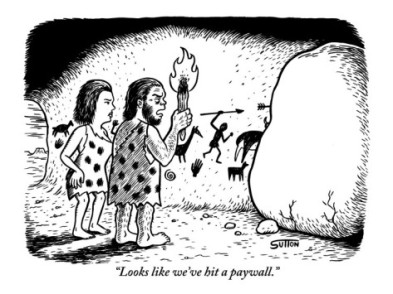
Like all the previous biweekly blogs, I have thoroughly enjoyed reading my peers thoughts on this final topic. Although it’s a shame that such a structured way of online, mutual and reciprocated learning is coming to an end, I will definitely be making personal endeavours to maintain this aspect of education in my future studies.
Both comments left on my blog by my classmates this week introduced me to ideas that I previously failed to consider, both in my blog and personal discussion. Jake presented me with the concept of advertising on academic papers (both online and in paper form). Whilst I appreciate that web banner adverts could be an effective way to generate revenues lost from subscription costs, I think that adverts on hard copies may not be as effective, as scholars may have reservations about their published research being plastered with marketing. However, online adverts could definitely be an effective way to generate money and promote the cycle of free access.
My classmates Yee-Ping (blog) and Alysia (blog) offered an economical perspective and a discussion on the open access to newspapers (respectively) that I never appreciated before. A combination of these two ideas somewhat altered my stubborn ‘pro-free access’ opinion. Yee-Ping explained how the internet can be seen as a ‘market place where goods and services should be exchanged’. Additionally, Alysia highlighted how we feel entitled to free access to newspapers online, when we would have previously paid for a physical copy. Why should our attitude to online information be so different? Linking to Yee-Ping’s notion, we have to appreciate when businesses offer their services online, such as the distribution of information, they are simply utilising a new ‘marketplace’, their information is not necessarily a ‘public good’ (Pang, 2014).
Considering the issues raised in my peer’s blog posts I would like to slightly change my previously published opinion. Whilst I still support free access to online academic journals where third-party funding exists (see my reply to Joy’s comment on my previous blog), I now appreciate that free access might not be suitable for all online material. I appreciate that paying for online access to materials like newspapers may seem unfair, but where businesses previously relied on the public paying for their information distribution; we cannot simply assume our right to acquire it free digitally. I now believe that free access to online materials should be practiced as much as possible, but not to the detriment of the financial performance of a business.
As always, I thoroughly enjoyed reading my peer’s blogs, tweets and opinion on this subject. I thank them for furthering my learning and introducing me to ideas and helping me shape my opinions.